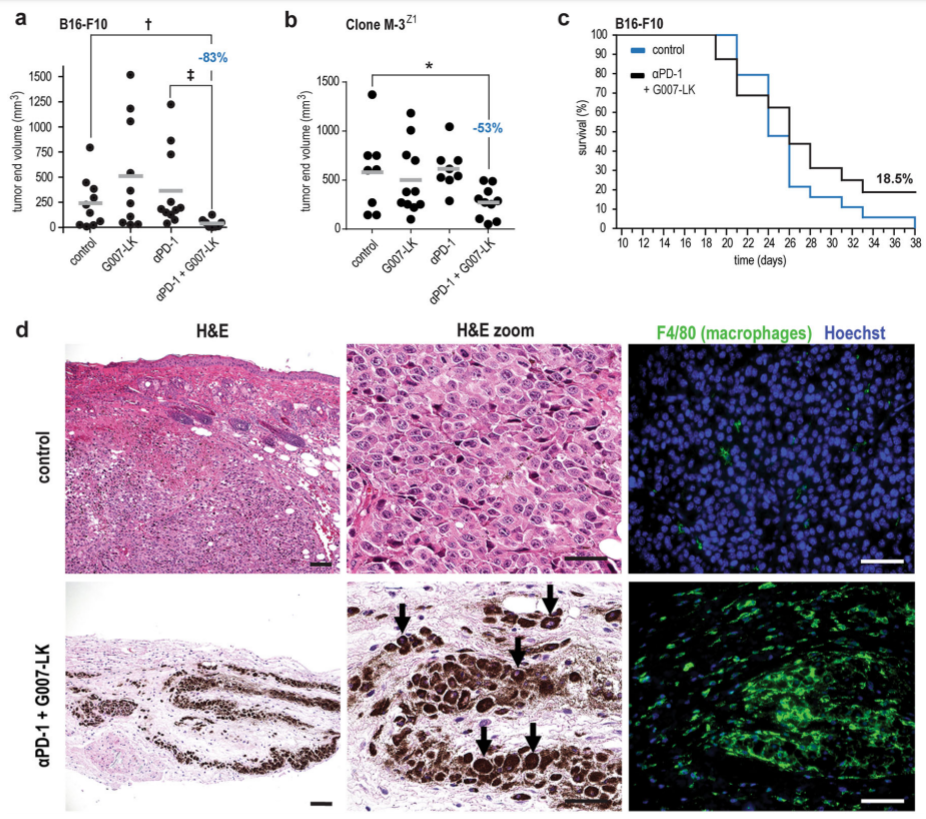 The development of immune checkpoint inhibitors represents a major breakthrough in cancer therapy. Nevertheless, a substantial number of patients fail to respond to checkpoint pathway blockade. Evidence for WNT/β-catenin signaling-mediated immune evasion has been found in a subset of cancers including melanoma. Currently, there are no approved therapeutic strategies available for targeting WNT/β-catenin signaling. In this study we show for the first time in a syngeneic murine B16-F10 mouse melanoma model that pharmacological tankyrase inhibition sensitizes tumors to anti-PD-1 immune checkpoint therapy. Our study uncovers a novel combinatorial therapeutic strategy to overcome β-catenin-mediated resistance to immune checkpoint blockade.
The development of immune checkpoint inhibitors represents a major breakthrough in cancer therapy. Nevertheless, a substantial number of patients fail to respond to checkpoint pathway blockade. Evidence for WNT/β-catenin signaling-mediated immune evasion has been found in a subset of cancers including melanoma. Currently, there are no approved therapeutic strategies available for targeting WNT/β-catenin signaling. In this study we show for the first time in a syngeneic murine B16-F10 mouse melanoma model that pharmacological tankyrase inhibition sensitizes tumors to anti-PD-1 immune checkpoint therapy. Our study uncovers a novel combinatorial therapeutic strategy to overcome β-catenin-mediated resistance to immune checkpoint blockade.
The study was published in the Communications Biology (Nature group, impact factor 7.5 - 10)
Read the article here: https://www.nature.com/articles/s42003-020-0916-2
Abstract
The development of immune checkpoint inhibitors represents a major breakthrough in cancer therapy. Nevertheless, a substantial number of patients fail to respond to checkpoint pathway blockade. Evidence for WNT/β-catenin signaling-mediated immune evasion is found in a subset of cancers including melanoma. Currently, there are no therapeutic strategies available for targeting WNT/β-catenin signaling. Here we show that a specific small-molecule tankyrase inhibitor, G007-LK, decreases WNT/β-catenin and YAP signaling in the syngeneic murine B16-F10 and Clone M-3 melanoma models and sensitizes the tumors to anti-PD-1 immune checkpoint therapy. Mechanistically, we demonstrate that the synergistic effect of tankyrase and checkpoint inhibitor treatment is dependent on loss of β-catenin in the tumor cells, anti-PD-1-stimulated infiltration of T cells into the tumor and induction of an IFNγ- and CD8+ T cell-mediated anti-tumor immune response. Our study uncovers a combinatorial therapeutical strategy using tankyrase inhibition to overcome β-catenin-mediated resistance to immune checkpoint blockade in melanoma.